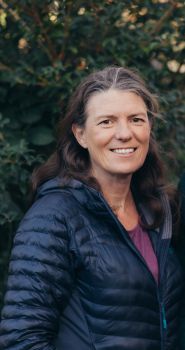Five minutes with Fiona Mathews: “By collaborating we hope to bring real change”
Posted on behalf of: Internal Communications
Last updated: Wednesday, 4 December 2024

Fiona Mathews, Professor of Environmental Ecology in the School of Life Sciences, is the lead researcher behind a Sussex Sustainability Research Programme project enhancing equitable and sustainable forest restoration in the Ecuadorian Andes. The Andes are home to a variety of vulnerable and endangered species, including the real-life ‘Paddington’, who is an Andean bear.
I’m a conservation biologist, and work particularly on mammals. Much of my research is about monitoring animal populations, understanding the way in which they use landscapes, and tackling human-wildlife conflict. This involves everything from ‘wellie-boots’ field work, to molecular analysis and spatial modelling. I’m particularly interested in how we can use remote monitoring methods, such as camera trapping and static radiotracking networks, to collect large amounts of data in areas that are difficult to survey.
I’m currently working with a team from Sussex and the Ecuadorian Charity Fundación Cambugan, to identify sustainable futures for Andean bears – the real-life inspiration for ‘Paddington’. This means not only protecting their forest habitat, which is being lost at a rate faster than most other regions on earth, but also supporting communities to find ways of generating income that are not dependent on deforestation. By collaborating with charities, government agencies and local people, we hope to bring real change to the region.
Although it is partly my work, I also really enjoy a night out monitoring bats! Many of my best friends are bat people, and we can often be found outside a cave at 3am, excited to know what we’re going to find next. I guess it’s a bit like the appeal of fishing! It also helps to stop me disappearing too far up the ivory tower, and inspires me to find solutions to real-world problems. Beyond ecology, I’m generally an outdoors person, and most days will see me either running or wild swimming (or both).
My favourite thing about Sussex is that cross-disciplinary collaboration is genuinely encouraged. My current work on Andean bears wouldn’t be possible without the brilliant input from colleagues in Anthropology, Law and Geography; and my PhD students are co-supervised by people from Engineering and Informatics. Most people look first to biologists to tackle the biodiversity crisis, but the truth is that we need all the tools in the box, and biology is just one element.
I’d like to write another popular science book. Black Ops and Beaver Bombing (available in all good bookshops) was nominated for the Wainwright Prize last year, which was really exciting for a first book. I enjoy the challenge of trying to communicate science in a way that was entertaining whilst also staying true to the facts. The topic of the next book is still up for grabs!
